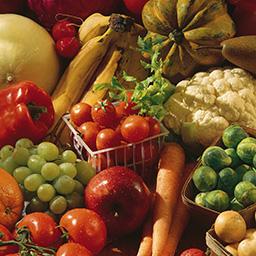Cancer Prevention Diet Tips

Implementing healthy eating habits can play an important role in reducing your cancer risk. Here are 10 cancer prevention lifestyle changes that will transform your diet and improve your overall health:
1. Maintain as lean a frame as possible without becoming underweight.
- Learn your body mass index (BMI) to see if you are at a healthy weight for your height.
- Obesity is associated with many ailments, including diabetes, heart disease, stroke and high blood pressure. It has also been linked to increase people’s risk of cancer.
- Even if you have a healthy BMI, a larger waistline and carrying more belly fat is also linked to increased cancer risk.
2. Adjust food portion size.
- Eat larger portions of fruits and vegetables.
- Eat smaller portions of meat, starches and desserts.
- Use smaller plates to encourage smaller portions.
- Measure foods when cooking.
- Share leftovers with family and friends.
3. Be physically active for at least 30 minutes every day.
- You don’t have to exercise for 30 minutes at once. You’ll get the same health benefits if you break the allotted time up into two or three smaller sessions.
- Limit sedentary activities like watching TV, surfing the internet and playing video games.
4. Limit sugary foods and drinks.
- No more than 10 percent of daily calories should come from sugar. If you’re eating a 2,000 calorie a day diet, that amounts to around 12 teaspoons of sugar. One teaspoon of sugar is equal to four grams. Most Americans eat about 20 teaspoons of sugar per day.
- Avoid eating fast foods.
- Limit consumption of foods and drink that are processed or high in added sugar.
5. Eat a wide variety of vegetables, fruits, whole grains, legumes and other high fiber foods.
- Aim for at least five servings of fruits and vegetables every day.
- Attempt to make two thirds of the foods you eat plant-based.
- Avoid frying your fruits and vegetables, or covering them in creamy sauces. Instead, steam, broil, microwave, sauté or bake them.
6. Eat less red meat.
- Red meat includes lamb, beef and pork, and has been classified as probably carcinogenic to human by the World Health Organization.

7. Avoid processed meats.
- Processed meats include hot dogs, ham, corned beef, beef jerky and certain deli meats.
- They are classified as carcinogenic to humans by the World Health Organization and have been shown to increase cancer risk.
8. Limit alcohol intake.
- Men should limit all alcoholic beverages to two per day, and women should only have one.
9. Avoid a diet high in sodium.
- It is recommended that people have no more than 2300mg of salt in a day.
- 90 percent of American eat too much sodium.
- Substitute herbs and spices for salt.
- So-called low sodium foods and condiments may still have a lot of salt. Read labels to be sure of what you’re ingesting.
10. Do not rely on supplements for a healthy diet.
- Try your best to meet your nutritional needs through diet alone.
- Before incorporating any supplements in your diet, talk to your doctor.
- Supplements are not recommended for cancer prevention.
From apps to websites to plain old pen and paper, there are many ways to track your caloric intake. If you’re looking for a place to start, try the USDA’s MyPlate app, which can give you a personalized nutrition and activity plan.